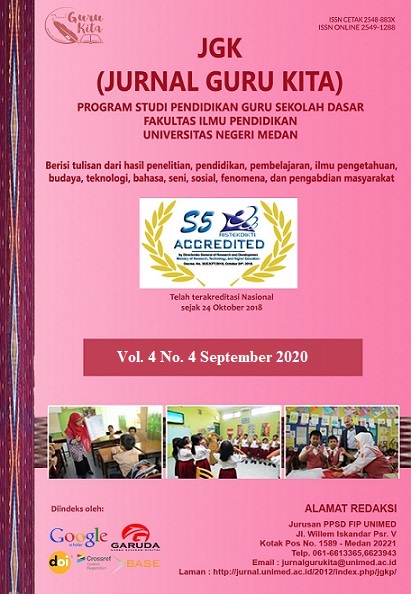META ANALISIS KEEFEKTIFAN INQUIRY BASED LEARNING TERHADAP KEMAMPUAN BERPIKIR KRITIS PEMBELAJARAN TEMATIK SEKOLAH DASAR
DOI:
https://doi.org/10.24114/jgk.v7i1.40662Keywords:
Inquiry Based Learning, Kemampuan Berpikir Kritis, Pembelajaran TematikAbstract
Critical thinking is one of the abilities that must be possessed by students. One of the preferred learning models in the implementation of the 2013 Curriculum is the inquiry learning model (Inquiry Based Learning). The purpose of this study was to test the effectiveness of the inquiry-based learning model in improving students' critical thinking skills from thematic learning in elementary schools in published experimental research using the meta-analysis method. The data analysis technique used is ancova test and effect size. The articles used were published in 2016-2021. The results of the analysis show that the significance value for the Inquiry Based Learning variable is 0.000. Because the value of Sig. < 0.05 then H_o is rejected. This shows that at the 95% confidence level it can be said that there is a linear relationship between Inquiry Based Learning and the critical thinking skills acquired by students. The results of the analysis using the random effect model show that there is a significant positive correlation between the application of the Inquiry-Based Learning model and critical thinking skills. Researchers suggest to complement the results of this study in improving students' critical thinking skills with other learning models in accordance with the latest process standards from the Ministry of Education and Culture.References
Anderson, L., Hibbert, P., Mason, K., & Rivers, C. (2018). Management Education in Turbulent Times. Journal of Management Education, 42(4), 423“440. https://doi.org/10.1177/1052562918779421
Anjarwati, A., Oktaviaji, F., Karimah, I., Santoso, M. Y., Agustin, Y., &
Suharwati, Z. (2020). Meningkatkan Wawasan Tentang Pengetahuan Tujuh Prinsip Palang Merah Remaja pada Siswa di SD Negeri Pabean Kabupaten Probolinggo Tahun 2022. Jurnal Guru Kita, 6(4), 398“410.
As™ari, A. R., Mahmudi, A., & Nuerlaelah, E. (2017). Our Prospective Mathematic Teachers Are Not Critival Thinkers Yet. Journal on Mathematics Education, 8(2), 145“156.
Avvisati, F., Echazarra, A., Givord, P., & Schwabe, M. (2018). Indonesia - Country Note - PISA 2018 Results. https://doi.org/10.1007/978-94-6209-497-0_69
Christanto, F. W., Affandi, M. F., & Winarti, T. (2020). Image Tracking Berbasis Augmented Reality Untuk Relasi Antara Sunnah Nabi dan Manfaat Secara Medis. JUITA: Jurnal Informatika, 8(1), 75“82. https://doi.org/10.30595/juita.v8i1.5541
Dachi, R. A. (2017). Proses dan Analisa Kebijakan Kesehatan (Suatu Pendekatan Konseptual) (Cetakan Pe; C. M. Sartono, Ed.). Yogyakarta: Deepublish.
Dewi, W. A. F., & Wardani, K. W. (2021). Metaanalisis Efektivitas Model Pembelajaran Inquiry Dan Problem Based Learning Terhadap Kemampuan Berpikir Kritis Matematis Siswa Sekolah Dasar. Jurnal Basicedu, 5(3), 1241“1251.
Herrera Ortiz, A. F., Cadavid Camacho, E., Cubillos Rojas, J., Cadavid Camacho, T., Zoe Guevara, S., Rincón Cuenca, N. T., ¦ Giraldo Malo, R. (2021). A Practical Guide to Perform a Systematic Literature Review and Meta-analysis. Principles and Practice of Clinical Research Journal, 7(4), 47“57. https://doi.org/10.21801/ppcrj.2021.74.6
Mudjiono, D. (2015). Belajar & Pembelajaran (1st ed.). Jakarta: Rineka Cipta.
Rozak, A., Fauzan, F., & Nurdin, A. (2010). Kompilasi Undang-undang & Peraturan Bidang Pendidikan (1st ed.). Jakarta: FITK Press UIN Syarif Hidayatullah Jakarta.
Santia, I., Purwanto, Sutawidjadja, A., Sudirman, & Subanji. (2019). Exploring Mathematical Representations in Solving Ill-Structured Problems: The Case of Quadratic Function. Journal on Mathematics Education, 10(3), 365“378. https://doi.org/10.22342/jme.10.3.7600.365-378
Susilowati, W. (2020). Meta-Analisis Pengaruh Model Inquiry Learning Terhadap Keterampilan Berfikir Kritis Pada Mata Pembelajaran Tematik. Jurnal Ilmiah Pendidikan Profesi Guru, 3(1), 211“216. Retrieved from https://ejournal.undiksha.ac.id/index.php/JIPPG/article/view/28193
Syafrial, S. (2018). Meta-Analisis Cooperative Learning Terhadap Kemampuan Berpikir Kritis Pada Pembelajaran Ipa/ Fisika Siswa. Journal of Teaching and Learning Physics, 3(1), 27“33. https://doi.org/10.15575/jotalp.v3i1.6550
Vasquez-Castillo, W., Ayala, K., Almeida, M., Barrientos-Priego, A. F., Moncayo-Moncayo, P., & Monteros-Altamirano, Ã. (2022). Morphological in situ Characterization of Mortiño (Vaccinium Floribundum Kunth) in the Andes of Ecuador. International Journal on Advanced Science, Engineering and Information Technology, 12(5), 1714“1720. https://doi.org/10.18517/ijaseit.12.5.15157
Yoon, H.-G., Joung, Y. J., & Kim, M. (2012). The Challenges of Science Inquiry Teaching for Pre-Service Teachers in Elementary Classrooms: Difficulties on and Under the Scene. Research in Science & Technological Education, 42(3), 589“608. https://doi.org/10.1007/s11165-011-9212-y
Downloads
Published
How to Cite
Issue
Section
License
Authors published with the JGK (Jurnal Guru Kita) agree to the following terms:
- Authors retain copyright and grant the journal the right of first publication with the work simultaneously licensed under a Creative Commons Attribution License (CC BY-SA 4.0) that allows others to share the work with an acknowledgment of the work's authorship and initial publication in this journal.
- Authors are able to enter into separate, additional contractual arrangements for the non-exclusive distribution of the journal's published version of the work (e.g., post it to an institutional repository or publish it in a book), with an acknowledgment of its initial publication in this journal.
- Authors are permitted and encouraged to post their work online (e.g., in institutional repositories or on their website) prior to and during the submission process, as it can lead to productive exchanges, as well as earlier and greater citation of published work. (See The Effect of Open Access)




























